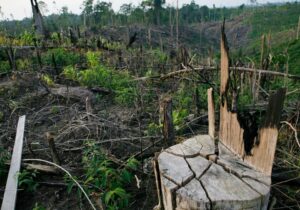
This week, the EU Deforestation Regulation text was approved by the EU Parliament Environmental Committee (ENVI).
The Committee vote is not final. The Council and the Parliament will also vote on this matter over the coming weeks.
When the regulation is adopted into law this year, it will oblige the EU’s 27 member states to cut imports of commodities which they believe are responsible for the destruction of standing trees, especially rainforests, stopping suppliers from selling palm oil, cattle, soy, coffee, cocoa, timber, rubber and products made from these commodities.
As previously reported, Asian countries are showing increasingly dissatisfaction towards the regulation because it is a deliberate action to restrict palm oil exports from Indonesia and other oil palm producing countries.
Last week, the Malaysian government made it clear that the law was unfair and threatened to halt all exports of palm oil to the EU while encouraging all additional members of the Council of Palm Oil Producing Countries to fight the law.
Now, the Indonesian government and the Indonesian Palm Oil Association (GAPKI) joins the objections and says the law ignores the objectives of the Paris Agreement and Sustainable Development Goals and disregards efforts by developing countries to combat deforestation.
After the EU-ASEAN Summit held in December 2022, Indonesian President, Joko Widowo, stated it was a situation of EU dictating its standards assuming it to be better than developing country standards.
Joko Supriyono, chairman of GAPKI, said the proposal is a protectionist ploy aimed at blocking palm oil imports and that EU should pursue cooperation with the producing countries while warning the legislation will increase prices.
– The vote is a step towards another EU trade ban on Indonesian palm oil. The EU Parliament is showing a clear disregard for Indonesia, the largest economy in Southeast Asia. The Parliament’s proposal undermines forest protection, by pursuing confrontation instead of cooperation. Norway’s agreement with Indonesia is a constructive approach; the EU’s approach is unilateral and antagonistic, Joko said.
Indonesia and 13 other developing nations have formulated a letter to EU protesting against the law outlining that small scale farmers of palm oil will be blocked from the EU market sending a clear message of the EU not caring about poverty reduction and assisting Indonesia in reaching its ESG targets.
The organisation further pointed out the lack of recognition of existing sustainability schemes means duplication of regulation for palm oil businesses, the requirements on traceability undercut or duplicate existing efforts by the palm oil industry and that there is serious concern this will be a protectionist trade barrier deliberately targeted at developing nations.
Malaysian Foreign Minister, Zambry Abdul Kadir, said the EU deforestation law is a step against good kinship.
– Jokowi’s speech has made it clear that […] the policy is of concern to ASEAN. That the EU cannot dictate. This is an opportunity for Indonesia and Malaysia to join forces and be united in our voices, he said.
According to Indonesia Palm Oil Facts, a platform supported by GAPKI dedicated to “separating the facts from the fake news and false claims against Indonesian palm oil”, the law meets condemnation even within Europe emphasizing Ferdi De Ville, a professor in European political economy at the University of Ghent, stated the Regulation is filled with hypocrisy as it prevents developing countries in doing what Europa and the developed world have done for centuries by supporting development and critical industries.
The platform further highlighted a managing partner at prominent Brussels law firm, Van Bael & Bellis, noted EU’s behavior was “regulatory imperialism”.
One might argue the EU Deforestation Regulation ignores certain facts about Indonesia palm oil.
According to Mongabay, a conservation news website, deforestation associated with palm oil has fallen by 82% the past decade in Indonesia despite a rise in palm oil prices which, historically, has been associated with the exact opposite – a rise in deforestation rates. Further, researchers have attributed the continued decline in palm oil deforestation to the rising adoption of zero-deforestation commitments as well as public supply chain reporting by companies.
As the Council and Parliament votes approach, the Indonesian government and palm oil sector continues to refute components of the Regulation and engage with their allies to put pressure on the EU to reverse course.
Sources: https://www.indonesiapalmoilfacts.com/anger-growing-in-asean-capitals-as-eu-parliament-committee-votes-on-deforestation-regulation/ https://news.mongabay.com/2022/10/sustainability-pledges-help-indonesia-produce-palm-oil-with-less-deforestation/amp/



